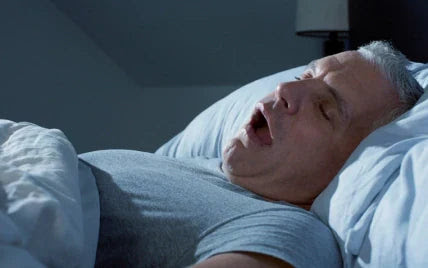By Destiny Uko
In an age where fatigue and sleep disturbances are increasingly common, many people search for answers in stress, diet, or screen time. However, one often-overlooked culprit may be quietly undermining sleep quality and daily energy: chronic mouth breathing.
Though frequently dismissed as a minor habit, regularly breathing through the mouth, particularly during sleep, can have serious consequences for physical health and mental function.
Nasal Breathing
The human body is naturally designed to breathe through the nose. Nasal breathing filters particles, humidifies air, and regularises oxygen intake. Mouth breathing bypasses these benefits and may cause long-term harm.
Nasal breathing also plays a role in maintaining oral posture. When it’s interrupted due to congestion, habit, or structural issues, the consequences can develop over time.
This form of breathing encourages oxygen absorption through “nitric oxide” production in the sinuses, a benefit lost when breathing through the mouth.
How Does Mouth Breathing Impair Sleep?
People who breathe through their mouths at night often snore or experience sleep apnea, a condition that interrupts breathing during sleep and prevents deep rest.
The consequences include:
- Dry mouth or sore throat upon waking
- Frequent awakenings during the night
- Morning headaches
- Daytime fatigue
- Bad breath and oral health issues
Experts note that mouth breathing can result in poor sleep, with ripple effects on energy, mood, and concentration levels.
Moreover, researchers have found that chronic mouth breathers often suffer from a reduced amount of deep sleep. When sleep is repeatedly disrupted, the body fails to properly regenerate cells, balance hormones, and retain memory.
This is particularly problematic because chronic fatigue can be linked to many causes, leaving mouth breathing unnoticed. Individuals may undergo multiple tests or treatments without realising that a basic function like breathing is contributing to their symptoms.
Signs You May Be a Mouth Breather
- Dry mouth or chapped lips
- Snoring or open-mouth sleeping
- Unrefreshed sleep
- Bad breath
- Dark circles under the eyes
- Gum problems or dental crowding
Additionally, posture can suffer. Mouth breathing often leads to forward head posture, which places strain on the neck and shoulders, increasing feelings of fatigue.
Common Causes of Mouth Breathing
Causes may include Nasal congestion (allergies, infections), deviated septum, enlarged tonsils or adenoids, chronic nasal inflammation, learned behavior/habit and blocked nose during a cold
While a blocked nose due to a cold might lead to temporary mouth breathing, chronic issues often need medical intervention.
Long-term impacts of chronic mouth breathing are obstructive sleep apnea, heart disease, high blood pressure, increased dental decay and gum disease, among others.
Preventing Mouth Breathing
Some proven strategies to combat this are:
1. Medical Consultation
Sleep specialists can assess structural or airway issues. A sleep study might reveal whether obstructive sleep apnea is at play.
2. Allergy Control
Decongestants, or immunotherapy, can help relieve nasal blockages. Air purifiers and reducing allergens in the bedroom can also support nasal breathing.
3. Surgery
Septoplasty or tonsil/adenoid removal may be needed in severe cases. These procedures can open the airway and allow natural nasal breathing to resume.
4. Postural Adjustments
Correcting forward head posture and supporting good sleep patterns can reduce muscle tension and improve airway flow.
5. Hydration and Oral Care
Chronic mouth breathers are at higher risk of dental problems. Drinking water regularly, using fluoride toothpaste, and seeing a dentist frequently are important steps.
Understanding mouth taping
The trend of mouth taping during sleep has gained popularity online, though it must be approached cautiously.
Although some people find it helps train their bodies to breathe through the nose, it’s not a fix for underlying medical issues and shouldn’t be used in cases of nasal blockage or suspected sleep apnea.
Consulting a healthcare professional before attempting mouth taping is strongly advised.
Mouth breathing may seem trivial, but it can severely affect sleep, energy, and long-term health. Recognising the signs and seeking proper treatment can make a significant difference in one’s well-being.
Chronic mouth breathing, often overlooked, can significantly impair sleep quality and daily energy levels, contributing to issues like snoring, sleep apnea, morning headaches, dry mouth, and daytime fatigue. The human body is designed for nasal breathing, which filters and humidifies the air, promoting better oxygen absorption through nitric oxide production. Mouth breathing bypasses these benefits and disrupts oral posture and health.
Common causes include nasal congestion, deviated septum, enlarged tonsils, or learned behavior, which could lead to obstructive sleep apnea, heart disease, and dental issues. Preventive strategies involve medical consultation, allergy management, structural surgeries, postural corrections, and improved hydration and oral care.
The recent trend of mouth taping for training nasal breathing should be approached with caution and under medical guidance, especially when nasal blockages or sleep apnea are suspected. Recognizing the signs of mouth breathing and seeking appropriate treatments is crucial for enhancing sleep, energy, and overall health.






